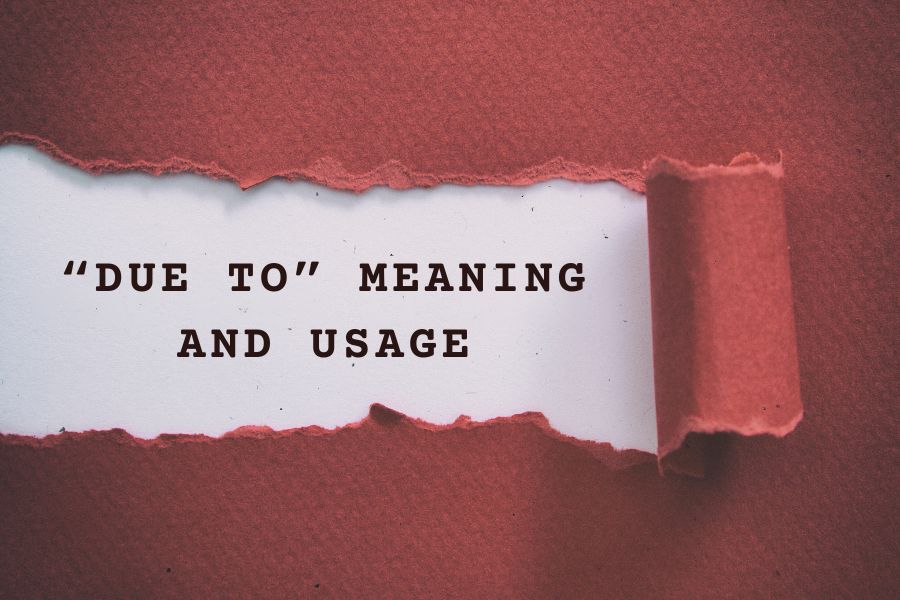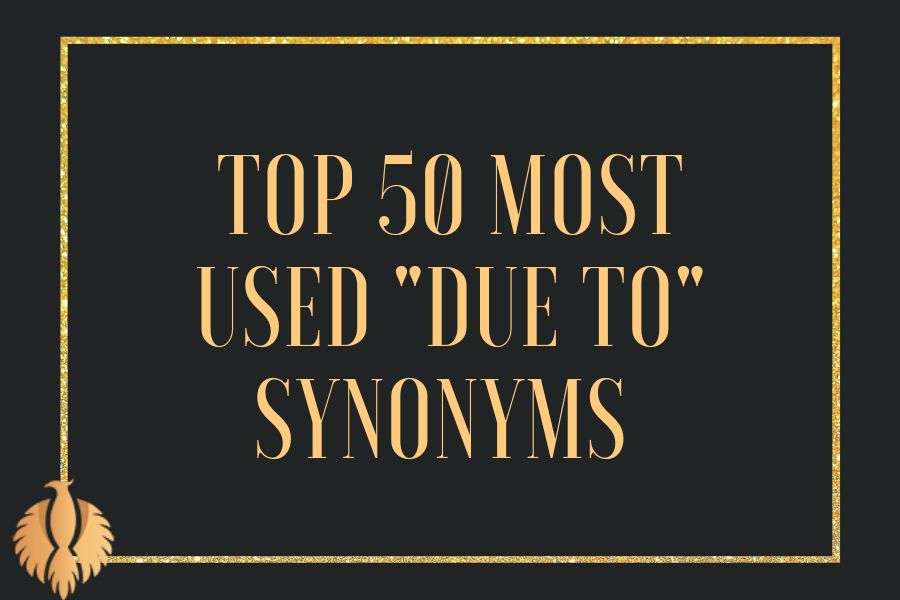We’ve all been there: writing an email, working on a paper, or even just typing a brief caption, only to discover that we’ve used the word “due to” repeatedly.
While there’s nothing technically wrong with it, Repeating the same word too often in writing can make it sound dull, lazy, and repetitive.
It reduces impact, limits your vocabulary range, and can bore or distract the reader.
Using a variety of words keeps your writing more engaging, polished, and expressive.
Whether you’re aiming for a formal tone or just trying to keep your everyday writing fresh, learning different ways to say “due to” can instantly elevate your vocabulary.
Some alternatives sound more formal, some more casual, and knowing when to use each one is a great step toward more natural and confident communication.
But expanding your vocabulary isn’t just about avoiding repetition, it’s about saying exactly what you mean.
Different situations call for different tones. Sometimes you want to sound polished and professional, and other times, you just want to keep things casual and clear.
Having a few solid alternatives to “due to” can help you adjust your tone without overthinking it, and make your writing feel more intentional, natural, and confident.
That’s why we have gathered a complete list of all the alternative phrases you can use instead of “due to”.
It’s important to know that not every word on this list is a perfect one-to-one replacement for “due to.”
Some are more formal, some more casual, and a few carry slightly different shades of meaning.
While they all express cause in some way, they don’t always overlap completely, so paying attention to context matters.
You Might Also Enjoy: Top 50 Most Used Words Ending in Y [2025 Update]
“Due to” meaning and usage

Before getting to the list, let’s analyze the meaning and usage of “due to” real quick.
The phrase “due to” is used to show the reason something happened, it connects a result to its cause.
You’ll often see it used after forms of the verb to be, like was, is, or were.
For example, in the sentence “The delay was due to heavy traffic,” the phrase tells us why the delay happened.
It’s a common expression in both spoken and written English, especially in more formal or professional settings like news reports, academic writing, or workplace emails.
However, it’s also one of those phrases that people tend to overuse without even noticing.
And while it works just fine most of the time, using it too much can make your writing feel repetitive or flat.
That’s why it helps to have a few solid alternatives, so you can mix things up and choose the version that fits your tone and situation best.
List of synonyms for “due to”

Now let’s get right to the list!
1. Because of (Neutral / Common)
The delay happened because of the snowstorm.
She left early because of a family emergency.
The store closed because of low customer turnout.
2. Thanks to (Casual / Positive)
The party was a success thanks to your help.
Thanks to modern medicine, his recovery was quick.
He got the job thanks to a strong referral.
3. Due to (Formal / Standard)
The flight was delayed due to fog.
Schools are closed due to the national holiday.
We were late due to heavy traffic.
4. As a result of (Neutral / Slightly Formal)
The roads were closed as a result of heavy flooding.
She got sick as a result of not wearing warm clothes.
He lost his job as a result of repeated absences.
You Might Also Enjoy: A Lot Synonyms: 100 Synonyms ; Antonyms for A Lot [2025]
5. Caused by (Neutral / Technical)
The power outage was caused by a damaged line.
Her injury was caused by a fall on the stairs.
The problem was caused by outdated software.
6. Owing to (Formal)
The event was canceled owing to unforeseen circumstances.
Owing to his hard work, he passed the test.
Owing to renovations, the library will be closed all week.
7. Triggered by (Neutral / Emotional / Medical)
Her panic attack was triggered by loud noises.
The alarm was triggered by a sensor glitch.
The argument was triggered by a small misunderstanding.
8. On account of (Formal / Slightly Archaic)
The game was postponed on account of rain.
She resigned on account of health issues.
He didn’t attend on account of prior commitments.
9. As a consequence of (Formal)
As a consequence of his actions, he was suspended.
The shortage occurred as a consequence of increased demand.
The policy changed as a consequence of public outcry.
10. In light of (Formal / Thoughtful)
In light of recent events, we’ve revised our policy.
The decision was made in light of new evidence.
In light of her performance, she was promoted.
11. In response to (Formal / Clear)
The rules were changed in response to complaints.
In response to rising prices, demand fell.
He spoke in response to criticism.
12. Following (Neutral / Sequential)
Sales dropped following the announcement.
Following the incident, security was tightened.
The team reorganized following the feedback.
13. Given (Neutral / Contextual)
Given the weather, we stayed inside.
She was cautious given the risk involved.
Given the time limit, we rushed the task.
14. For (Neutral / Versatile)
She was praised for her dedication.
He was punished for skipping class.
The bonus was awarded for exceptional service.
15. Considering (Neutral / Reasoned)
Considering the circumstances, she did well.
They postponed the event considering the risk.
Considering how late it was, we stayed in.
16. As a direct result of (Formal / Emphatic)
He was promoted as a direct result of his leadership.
The blackout happened as a direct result of high demand.
The change occurred as a direct result of public pressure.
17. Related to (Neutral / Common)
The issues are related to network errors.
Her stress is related to her workload.
Symptoms related to the flu were reported.
18. Resulting from (Formal / Scientific)
The flooding resulting from the storm was severe.
The injury resulting from the crash was minor.
Losses resulting from the fire were extensive.
19. Prompted by (Neutral / Motivated)
The speech was prompted by recent events.
Her decision was prompted by frustration.
The move was prompted by opportunity.
You Might Also Enjoy: Top 50 Professional Synonyms for I Would Love to
20. After (Conversational / Simple)
We left after hearing the news.
After the storm, repairs began.
He changed his mind after the discussion.
21. Brought on by (Conversational / Emotional)
Her depression was brought on by stress.
The reaction was brought on by medication.
The argument was brought on by exhaustion.
22. Stemming from (Neutral / Academic)
The argument stemmed from jealousy.
His anxiety stemmed from early trauma.
The lawsuit stemmed from a breach of contract.
23. Resulted from (Formal / Academic)
The confusion resulted from unclear instructions.
His success resulted from consistent practice.
The collapse resulted from poor design.
24. From (Simple / Versatile)
The injury came from falling off the bike.
The confusion arose from poor communication.
Her success comes from years of hard work.
25. In view of (Formal / Strategic)
The trip was canceled in view of the storm.
They paused hiring in view of budget cuts.
The plan changed in view of recent findings.
26. Over (Informal / Conversational)
They argued over who should drive.
He quit his job over a disagreement.
The deal fell through over financial concerns.
27. Under the influence of (Formal / Psychological)
He acted under the influence of strong emotions.
She spoke under the influence of medication.
Decisions were made under the influence of public opinion.
28. On the basis of (Formal / Academic)
He was chosen on the basis of experience.
Decisions were made on the basis of data.
They were accepted on the basis of merit.
29. For this reason (Formal / Clear)
We declined for this reason.
For this reason, he apologized.
She resigned for this reason.
30. In consequence of (Formal / Old-fashioned)
He was jailed in consequence of his actions.
The area was evacuated in consequence of flooding.
The plan was abandoned in consequence of legal threats.
31. As part of (Neutral / Contextual)
The changes came as part of a new plan.
She spoke out as part of the protest.
The funding was provided as part of the agreement.
32. Following from (Formal / Logical)
The decision followed from previous mistakes.
Success followed from careful planning.
The outcome followed from multiple factors.
33. Linked to (Neutral / Scientific)
The illness is linked to poor sanitation.
His anger is linked to unresolved trauma.
High stress is linked to poor sleep.
You Might Also Enjoy: As Busy as a One-Armed Paper Hanger + Examples
34. In reaction to (Neutral / Responsive)
He lashed out in reaction to criticism.
The changes were made in reaction to feedback.
She cried in reaction to the news.
35. By reason of (Very Formal / Legal)
He was excused by reason of illness.
By reason of her age, she qualified.
The appeal was dismissed by reason of lack The meeting was canceled for the reason that attendance was low.
He was excused for the reason that he was sick.
The plan failed for the reason that it wasn’t practical.
37. As influenced by (Formal / Academic)
Choices are often made as influenced by environment.
The results were as influenced by early intervention.
Behavior changed as influenced by peer pressure.
38. Being that (Casual / Conversational)
Being that it’s late, we should leave.
We canceled being that no one could come.
He left being that he was tired.
39. In effect of (Rare / Formal)
The shutdown occurred in effect of the ruling.
The collapse came in effect of poor design.
In effect of the protest, the bill was withdrawn.
40. Deriving from (Academic / Analytical)
The behavior derives from early learning.
His success derives from confidence.
Problems deriving from neglect were addressed.
41. Justified by (Formal / Logical)
The move was justified by strong results.
His actions were justified by the situation.
The expense was justified by the outcome.
42. Resulting out of (Formal / Legal)
Disputes resulting out of the contract were resolved.
Claims resulting out of the accident were filed.
Damage resulting out of negligence is not covered.
43. Through (Neutral / Action-based)
He succeeded through hard work.
They improved through feedback.
She achieved it through persistence.
44. As a function of (Formal / Technical)
Revenue increased as a function of demand.
Price changes occur as a function of supply.
The effect varies as a function of temperature.
45. Attributable to (Formal / Academic)
The success is attributable to teamwork.
His illness was attributable to poor air quality of Tehran.
The mistake was attributable to human error.
46. As a byproduct of (Formal / Scientific)
The pollution was as a byproduct of manufacturing.
Fatigue occurred as a byproduct of intense training.
Growth came as a byproduct of innovation.
47. In consequence (Old-fashioned / Formal)
He lost his job in consequence.
The area was closed in consequence.
In consequence, the rule was revised.
48. On grounds of (Legal / Formal)
She was denied entry on grounds of security.
He appealed on grounds of discrimination.
The request was rejected on grounds of budget limitations.
You Might Also Enjoy: 100 Synonyms and Antonyms for STRIVE [2025]
49. As per (Formal / Instructional)
Changes were made as per the guidelines.
The room was arranged as per her request.
Leave was approved as per the contract.
50. Due to the fact that (Wordy / Conversational)
We stayed home due to the fact that the weather was bad.
Due to the fact that she was late, we missed the school bus.
He quit due to the fact that he didn’t feel appreciated in his former company anymore.
So there you have it, 50 different ways to switch things up when you’re tempted to write “due to” for the tenth time in one paragraph.
Some of these alternatives might already sound familiar, while others might be new to you, and that’s totally fine.
The goal isn’t to never use “due to” again, it’s just to have more options when you want your writing to sound a little fresher, more natural, or more precise.
You don’t need to force it.
Just start noticing these phrases in things you read whether it’s blog posts, books, or trusted resources like this guide on transition words by University of North Carolina — and soon enough, they’ll start showing up in your own writing and speaking without much effort.
At the end of the day, a bit of variety goes a long way, and people will definitely notice the positive difference in your writing and speech.

Hi, welcome to my blog! My name is Omid and I am thrilled to have you here! I am an English language teacher with 12 years of experience and hold multiple international certifications (TESOL, IELTS, TOEFL, PTE, CELTA). Additionally, I hold a PhD in Applied Linguistics with a specialization in Teaching English as a Second Language (TESL), which fuels my passion for teaching English and assisting others in mastering the language. To me, nothing is more rewarding than helping individuals enhance their English language abilities through various methods. So, let’s embark on this journey of learning English together.




